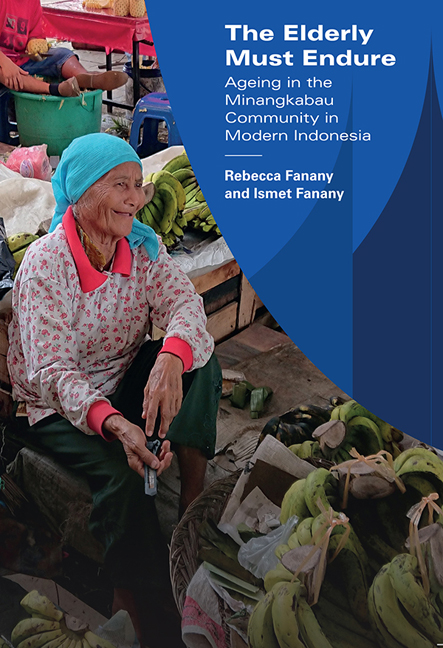Book contents
- Frontmatter
- Contents
- Acknowledgements
- Map of Indonesia
- Map of West Sumatra
- Map of the Village of Koto
- Aminah's Family Tree
- 1 Introduction
- 2 Ageing in the Past and Present
- 3 Adat Traditions and the Elderly
- 4 Religion and the Elderly
- 5 Language and the Elderly
- 6 Ageing in the Village
- 7 Ageing in Padang
- 8 Ageing in the Rantau
- 9 Ageing in an Institution
- 10 Ageing and Cultural Consonance
- 11 The Elderly Must Endure
- Afterword
- References
- Index
- About the Authors
10 - Ageing and Cultural Consonance
Published online by Cambridge University Press: 16 May 2019
- Frontmatter
- Contents
- Acknowledgements
- Map of Indonesia
- Map of West Sumatra
- Map of the Village of Koto
- Aminah's Family Tree
- 1 Introduction
- 2 Ageing in the Past and Present
- 3 Adat Traditions and the Elderly
- 4 Religion and the Elderly
- 5 Language and the Elderly
- 6 Ageing in the Village
- 7 Ageing in Padang
- 8 Ageing in the Rantau
- 9 Ageing in an Institution
- 10 Ageing and Cultural Consonance
- 11 The Elderly Must Endure
- Afterword
- References
- Index
- About the Authors
Summary
CULTURAL CONSONANCE
Cultural consonance relates to expectations an individual has for his or her own experience. Specifically, the concept refers to the degree to which a person's situation conforms to what he or she anticipated. This anticipation is often unconscious and relates to cultural norms and practices that were absorbed and learned from infancy. This understanding of cultural practices is closely associated with language (a means by which culture is transmitted) and allows a person to fit into and participate in his or her native society. Often people are not aware of their cultural expectations or how the fact of these expectations not being met might affect them, but they are very much aware of the impact of the lack of consonance, especially when it begins to affect physical or mental health.
The concept of cultural consonance was introduced by Dressler and colleagues (Dressler et al. 2005a; Dressler et al. 2005b) which they define as the extent to which the beliefs, perceptions and behaviour of individuals accord with prototypes that exist within their culture. The underlying assumption is that individuals wish to act in ways established by their culture of origin but may be unable to do so because of the context in which they live. This creates a source of stress that may manifest in physical disease or psychological distress. Dressler (2005), for example, found that higher levels of cultural consonance were associated with lower blood pressure and greater well-being in a number of studies. Similar results were obtained when cultural consonance was considered for various populations in several different locations (see, for example, Dressler and Bindon 2000).
The meaning of culture applied in the study of cultural consonance is of a body of knowledge that is learned and shared by individuals but that also has a location in a specific group of interest. In this, culture is assumed to be “distributed” (Sperber 1985) and to represent the body of shared learning that is required to function effectively within the social group (Goodenough 1996). Dressler et al. (2007) note that the distribution of cultural knowledge within a given group may vary, with culture potentially being shared by most members or by only a few, concentrated in one or several sub-groups, or widely distributed across society such that there exists a high level of both sharing and agreement.
- Type
- Chapter
- Information
- The Elderly Must EndureAgeing in the Minangkabau Community in Modern Indonesia, pp. 225 - 258Publisher: ISEAS–Yusof Ishak InstitutePrint publication year: 2018



